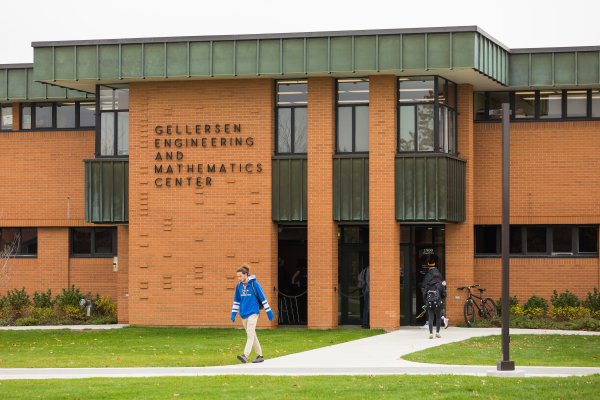Development of a Developer
Owen Prough ’12 loves his work as a software developer at Epic Systems, which serves health care organizations around the world. It is immensely satisfying, he says, to go to the office every day knowing that his work has a direct impact on the health care of more than 50 percent of the U.S. population.
“I was absolutely delighted to get this job,” says Prough, who has been working for Epic since shortly after his graduation from Valpo with a double major in computer science and math.
Meaningful, satisfying work is indeed a coveted privilege, and Prough believes that his education at Valpo prepared him for a highly competitive job market in more ways than one.
Academic rigor, and the profound insights that can come from mathematical analysis, played a critical role. It equipped him not only for the job market, but also for discerning patterns and finding solutions to all kinds of problems.
“During my senior year, I took a class called combinatorics [MATH 421/422], which, put simply, explores ways of counting things. That doesn’t sound very glamorous, but every time I learned something in that class, I immediately started seeing it everywhere I looked in the world,” Prough recalls. “I still use it.”
“Just the other day, I was talking to a friend, also a Valpo alumna, who teaches high school math. We were discussing ways to improve the efficiency of bus routes in her school system, and we started building an abstract model based on things we learned in combinatorics,” Prough says.
Prough and his friend hope to turn the school-bus problem into a project for her students. “What’s missing so often from math classes is real-world examples,” he observes.
Not so at Valpo, says Prough, who participated in several undergraduate research projects, including the creation of an artificial-intelligence strategy for a popular computer game.
Undergraduate research helped prepare Prough for the workplace in another important way: it taught him to work with a team.
“In my current position, it’s a very collaborative environment,” Prough says. “The developers work very closely with the quality assurance team and with our customers to ensure that the systems we’re building actually meet their needs.”
What some might consider softer skills — things like communicating concepts and understanding team dynamics — are actively cultivated by both the math and the computer science programs.
Prough gives credit, as well, to the academic variety he experienced through the liberal arts program he undertook as a student of Christ College, Valpo’s honors program.
“Being involved in not only the abstract areas of math and CS, but also the humanities courses I took as part of Christ College, expands my conceptual range,” he says. “It allows me have conversations on a wide variety of topics with interesting, informed people — which is one of my favorite things about my job.”
